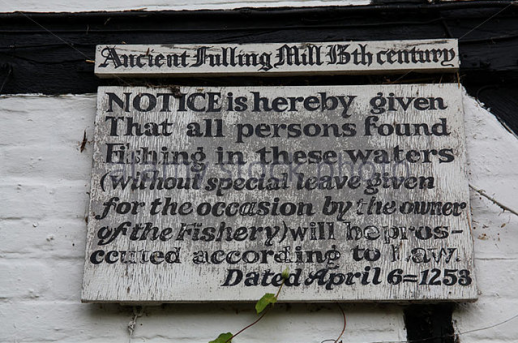This piece was originally published on Some Small Corner. Many thanks to Matt for allowing us to repost.
Words and pictures: Matt Poacher
Belched out of school’s hot throat into Spring’s amber dome. Late afternoon. Levitating with tiredness. I haunt the high street awhile, looking for an answer, a line of force. Aimless, I follow the familiar tip of gravity to the river.
Standing under the sign of the mill: ‘1243’ – a dictat from history: no fishing. The river is a bedlam of froth and roil; the land yipping and yawing. I think to take a photo, without really knowing why.
‘It’s not the original sign, you know’.
I turn to take in the voice, accept the presence; the self lazily processing, redrawing the job body consciousness has already mastered. His eyes are the first thing I notice – watery, red-rimmed: the revealing of unexpected flesh.
‘You must be a visitor?’ he says, nodding at my phone.
I stumble an explanation about having been down here before, but for whatever reason had never thought to take a photo. He looks mischievous, like he might not believe me. I tell him I work at the school; tell him it might as well be an island for how often we row back to the mainland, connect ourselves to the community. The kids, ferried in great buses, come as one, and leave as one – they might as well come in balloons. He frowns and I take in his age. 70? His posture suggests less, but those eyes. They fill again.
‘Ah. The school! Are you walking into town?’
We shuffle and talk. He tells me about the town, the old myth of the alder, the fire, the eel house he helped renovate (‘a wreck – like it had been ransacked by the land’), his cottage. He says the school remains something of a mystery – oddly out of bounds, an occulted presence in the edgelands, swelling with bodies and noise seven hours a day and then emptying again: an absence, conspicuous by its silence.
‘That’s pretty much exactly how I feel.’ I tell him I’m still learning the process of disgorging it all at the end of the day – mastering that task of emptying myself enough so I don’t rage and boil at night.
‘It’s no way to dream.’
The river is brick-banked where it meets the uncertain reaches of the town. Toddlers shriek at ducks, throw entire slices of bread; brooms of wisteria hover above the doors of homes and small businesses: saddleries, a brewery, a solicitors. We join the pavement and I hear a squeezed history: school in Surrey; Cambridge, with Dudley Moore up the hall (‘his room was never, ah, empty shall we say? He liked a party.’); training as a fighter pilot, cut short by asthma and glaucoma; IBM, selling computers (‘computers the size of that house there, for simple calculations’). He tells me he was at Cambridge in the early 50s; he’s 82. The shock of age.
‘I’m on my own now, but that’s OK. 8 years.’
I find myself asking, before I can check myself, ‘is it – OK, I mean?’
‘Well, not really. It’s too quiet.’ He stops and sighs.
‘I don’t have any complaints. But, you know.’
It’s not regret exactly, it’s something larger. The enormous inexpressibility of a life lived and no longer shared. He looks along the wide high street and I steal another look at his eyes. Language may fail us when we need it most, but, like it or not, we have our mute vessels, these expressive bodies with their lustres of freighted silence. He huffs back who knows what, and he tells me about his cottage again. Tells me the door is always open.
‘Give me a knock. I’ll show you the town.’
I can’t gather my intentions, can’t press the words into the right shapes. I want to take a knot of respectful silence and pass that over – an amulet, a talisman. We settle for something simple and shake hands.
‘Mike’, he says.
The sun has fallen beneath the roofline and the shadows are cold. As I walk back into the memory heat of the school grounds I notice the towering oaks, raw against the paling day. The rooks are nesting high this year, the rooks are nesting high.
